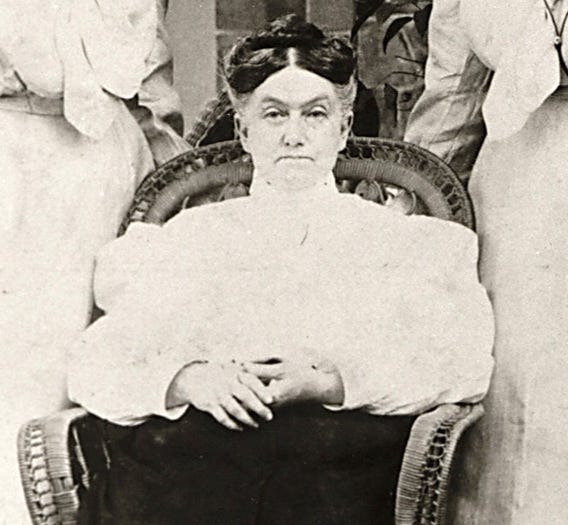Listen
Introduction
It’s that time of year again. The Lottie Moon Christmas offering is in full swing. In churches across America, children and adults, alike, are hearing stories of Moon’s heroic mission exploits and sacrificial service, as they reach deep into their hearts, and pockets, to support the Southern Baptists’ foreign mission effort. For more than a hundred years now, the larger-than-life legend of 4 foot 3 inch Lottie Moon has captivated the imagination of millions, raising more than 5 billion dollars for the sake of foreign missions. Last year (2022) saw a record 203 million dollars raised.
Moon’s sincere love for both the people of China and the gospel of Christ remains unquestionable, but there’s compelling evidence that the story of Lottie Moon has been white-washed, or ‘recharacterized’ for the sake of fundraising. It’s no secret that the Foreign Mission Board, during Moon’s day, was financially strapped, and there’s no shortage of historical data confirming that Lottie Moon was very much in the mold of first wave feminism.
When you go down the rabbit hole of history, the carefully curated myth of “Sweet Little Lottie,” gives way to a more complicated picture of a defiant woman who was often a giant headache to the foreign mission board—one which they tolerated, nonetheless, because she was (and is) their golden goose. In other words, Lottie Moon’s real story may actually be the story of how a desperate pragmatism enshrined an opportunistic feminism in the SBC—a legacy that plagues them to this day.
Lottie Moon, The Feminist
You don’t need to dig deep to discover that egalitarians have staked their flag on Moon, claiming her as their own, seeking to rebrand her as a feminist icon. They take exception with the Southern Baptist mythologizing of ‘Sweet Little Lottie,’ insisting that the saintly depiction of southern gentility is a paint job, if not a snow job, to make Lottie match the complementarian-styled aesthetic of the SBC.
A quick online search shows multitudes of articles singing Lottie’s feminist praise, and not without warrant. In Lottie’s own words: “What women have a right to demand is perfect equality.” This is patently feminist rhetoric used, time and again, to obscure, or obliterate gender distinctions grounded in God’s Word.
An article in the China Christian Daily attempts to explain Moon’s meteoric rise in fame, stating,
“The main reason is probably because she was the "pioneer of feminism" in the eyes of Americans and a model of international cultural exchange.”
In her biography on Moon, Historian Regina Sullivan chronicles Moon’s missionary career (albeit, from a feminist angle), highlighting Moon’s pattern of defiance to the polity and male leadership of the Foreign Mission Board. Sullivan writes,
“An actually remembered Moon would be a female activist who preached, argued for female equality and helped bring the WMU into existence.”
The facts seem to bear that out. As a new missionary, Moon quickly thumbed her nose at the very polity which had paved the way for her to enter the mission field; disregarding the rules set forth in the “Women’s Work for Women” initiative which governed women missionaries appointed to teach women and children on the mission field. Such work was evidently beneath Lottie Moon, who wrote:
“Can we wonder at the mortal weariness and disgust, the sense of wasted powers and the conviction that her life is a failure, that comes over a woman when, instead of the ever-broadening activities she had planned, she finds herself tied down to the petty work of teaching a few girls?”
When Moon began preaching directly to men, over and against mission polity, she initially cited the lack of male missionaries as her reason for entering the masculine domain, but as time would tell, Moon actually preferred to work without men. This can be seen later on in her career, as she broke away entirely from the mission board’s authority and began operating independently from any man.
As a result, the board refused further funding, so Moon made an appeal to the burgeoning women’s movement within the SBC. The women of the SBC rose up, organized to fundraise, and applied immense pressure on the mission board to continue supporting the defiant missionary. Moon rode the first wave of feminism right over the heads of the mission board and came out on top.
As a result, Moon was permitted to essentially write her own polity, which she did, naming it, ironically, after the very polity she had flouted—“Women’s Work for Women.” Why she adopted the same name is not entirely certain; perhaps as a victory lap, or maybe to maintain the illusion of submission? According to Sullivan, Moon wrote to the mission board that, ‘she not only wished to open new fields [mission stations], but she also wanted to see each of these new stations staffed with two unmarried women. She called her plan ‘women’s work for women,” cleverly adapting the policy that had sent her to China and that she had abandoned….Tellingly, she does not mention men or families in her plan...Moon based this formulation on her own experience in Pingtu, where she had had success without male presence or oversight.”
Lottie Moon was an incrementalist. Inch by inch, she took the whole mile. Over the course of 40 years, Lottie expanded the boundaries of “women’s work” until she and other women were doing everything men were permitted to do. Lottie took the gospel deep into the heart of China, and she took feminism deep into the heart of the Southern Baptist Convention, where it’s been festering ever since. By the end of Lottie’s mission career, she was effectively doing the work of an evangelist, preacher, church planter, and pastor; and there was nothing the foreign mission board could do to stop her—not if they wanted to keep on the good side of their new breadwinner; the WMU.
Though the mission board occasionally howled at Moon, she ultimately had them over a barrel. What Lottie didn’t like, Lottie didn’t do. When she didn’t get her way, she’d threaten to resign, or go around the board. She was the tail that wagged the dog.
Desperate Pragmatism
In the aftermath of a bloody civil war, men and money were scarce in the South, and the foreign mission board was strapped for both. Meanwhile, first-wave feminism was picking up steam. Within the Southern Baptist world, Lottie Moon and the Women’s Mission Union caught that wave and rode it for all it was worth. The Mission Board was left with a difficult decision; either stick to their guns, on gender, or get with the times. They chose to ride Lottie to the moon.
As Sullivan recounts,
“For the board, Moon’s popularity translated directly into money. They were deeply in debt and could not afford to see their funding diminished even slightly. They feared any controversy that might compromise fund-raising. Moon’s resignation would certainly have caused an outcry from Baptist women that the Foreign Mission Board literally could not afford.”
When Lottie Moon passed, at age 72, the mission board needed their golden goose to continue laying eggs, and thus, the “starvation” story was born. This myth originated from a memorial written, days after her death, which appeared in the Virgina Baptist newspaper portraying Moon’s death as, “heroic exertion and unexampled self-sacrifice….refusing food that the hungry might be fed.” The memorial concluded with a brazen plea for mission funding:
“Is there not some shame mingled with our sorrow? Shall we not, as a fitting tribute to her memory, lift at once the debt from the Foreign Mission board, the debt that weighed so heavily on the mind of this faithful worker? Is this not the memorial she herself would choose?”
The historical account surrounding moon’s death contradicts the climactic “starvation” myth, and points, rather, to delusions and dementia brought on by an infection, which was caused by a large abscess on the back of Moon’s neck. According to Sullivan’s research, Lottie’s attending physician, “Dr. James Gaston, who treated her, concluded that the infection had caused her condition.”
Nonetheless, the myth persisted, and became widely circulated in Una Lawrence’s 1927 biography, “Lottie Moon.” And according to Sullivan, “By the 1970’s, Moon’s sacrificial death had become a key component of the ‘Lottie Moon Story.’ This narrative of martyrdom has proven an amazingly successful fund-raising tool,…”
In 1988, on the centennial of the WMU’s founding, the headline for the Lottie Moon Christmas Campaign read—“Lottie Moon Is Starving Again.”
The campaign goes on to say:
“Just 76 years ago, foreign missionary Lottie Moon literally starved to death. She refused to see the Chinese people she loved go spiritually or physically hungry. So she gave all she had to give—from her food to her last ounce of strength…The 1988 goal is $84 million. If each Southern Baptist gives $10, we will not only reach, but surpass the goal. But if we don’t, what happened to Lottie Moon could happen to foreign missions. How much will you give to keep foreign missions alive?”
Even as late as 2007, Ed Stetzer implored Southern Baptists to adopt Lottie Moon as our model of giving, stating that she “starved to death,” and suggested that Lifeway produce WWLD bracelets—“What Would Lottie Do?”
As Sullivan put it,
“Moon’s remarkable life ended in 1912, but her memory has lived on, taking shape in a new narrative—one with such power and flexibility that it has changed Moon from a historical figure into a legendary symbol for Southern Baptists.”
Many moons later, the SBC continues to safeguard Lottie’s legend against the tarnish of truth. In 2020, when the woke apocalpyse visited the SBC, President J.D. Greear called on the convention to retire the Broadus gavel, so named for slaveholding Baptist preacher John Broadus. Greear, along with other convention leaders, were more than willing to dig up the bones of old, dead white guys and feed them to the dogs, so as to signal their virtue and appease the woke mob.
The fact that this was a pragmatic performance, and not a principled stand can be seen, readily enough, in the fact that nobody said a word about Lottie Moon’s family being the largest slaveholder in the area, or the fact that Moon was converted under the preaching of John Broadus. There were no calls to retire the Lottie Moon Christmas offering. Why not? The answer is because Lottie Moon is still laying golden eggs, and the pragmatic leaders of the SBC didn’t want their goose cooked. Come Christmas, they need Moon to shine!
Feminist Defiance—Lottie’s Legacy Lives On
Moon’s defiant attitude towards male authority still plagues the SBC, living on in the Women’s Mission Union, and in hundreds, if not thousands, of churches still actively campaigning for women’s ordination in the SBC. In fact, Lottie’s girlhood church, established the year she was born (1840), was recently led by a woman pastor.
For thousands of egalitarian women inside the SBC, Lottie is a hero for defying the patriarchy; an example to follow—and they seem plenty determined to carry on her legacy.
Having spent most of my life in the SBC, I’ve witnessed, firsthand, this pervasive attitude of defiance—including wives publicly disrespecting their husbands, and women actively undermining their pastors. As a pastor myself, I know what it is to be on the other end of warring women as they organize against your leadership. I was once maligned so extensively during a WMU meeting, that a full paragraph of lies and complaints, guised as ‘concerns’ (about me), made the official meeting minutes.
There’s a long history here, and it traces back to the earliest influence of feminism, which the SBC unwittingly enshrined when they permitted Lottie and the WMU to walk all over them for 40 years. These weak, pragmatic men set a precedent that has persisted, for more than a century, right up to our present day. By now, it’s practically baked into the cake. As Sullivan states in her book, “Since 1889, the Women’s Missionary Union has existed as an independent female organization with its own officers and budget, free from the control of the male leadership.”
In the 1990’s, Dr. Adrian Rogers addressed the detrimental influence of an autonomous WMU, when they, once again, thumbed their nose at the leadership of the SBC by supporting the Cooperative Baptist Fellowship; an egalitarian network that broke away from the SBC.
Dr. Rogers proposed that the WMU be entirely restructured, with a board elected by the denomination’s governing body. Dr. Rogers also called for an end to the “feminization of missions.” This was a wise, and principled response to a problem that has persisted for far too long. We need more men like Rogers leading the SBC, instead of unprincipled pragmatists led around by the nose.
As someone once said, “You become what you tolerate, and what you celebrate.” Unfortunately, this includes Lottie’s legacy of feminist defiance.
Closing Thought
For 150 years now, The Southern Baptist Convention has tried to have their Moon cake and eat it, too. They’ve tried to harness Moon’s fame to fuel foreign missions, all the while, trying to keep Moon’s feminism from devouring the SBC. To hear them tell it—Sweet Little Lottie hung the moon!
*As an alternative to supporting a woke, feminist SBC, consider supporting a small, biblically-faithful, reformed baptist church plant directly.
Pastor J.B. Durham is educated & ordained in the SBC, and works to reform the baptist world. Your support is greatly appreciated!
Reserve your copy of my forthcoming e-book!
“Put In Order” is a politically-incorrect sermonic commentary on the book of Titus. For a donation of any amount, you can reserve your copy today!
Suggested donation: $5.00
If a donation is not in your budget, email me for a free copy! jbdurham@protonmail.com










